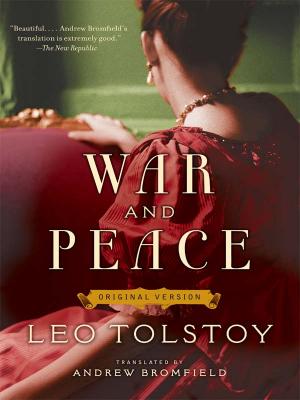ТОП просматриваемых книг сайта:
War and Peace: Original Version. Лев Толстой
Читать онлайн.Название War and Peace: Original Version
Год выпуска 0
isbn 9780007396993
Автор произведения Лев Толстой
Жанр Классическая проза
Издательство HarperCollins
“Strange,” he whispered to Boris, “she is not good-looking, the younger Rostov girl, this little black-haired one here, but what a lovely face! Don’t you think so?”
“The elder girl is better-looking,” replied Boris, smiling almost imperceptibly.
“No, but just fancy that! All the features are irregular, but how wonderfully lovely she is.”
And Pierre kept looking at her. Boris expressed surprise at Pierre’s having such strange taste. Nikolai was sitting far away from Sonya beside Julie Akhrosimova, replying to her affectionate and ecstatic utterances, while constantly glancing at his cousin to reassure her and make her feel that wherever he might be, at the other end of the table or the other end of the world, his thoughts would always belong to her alone. Sonya smiled ostentatiously, but she was clearly already tormented by jealousy, turning pale and red by turns and straining with all her might to hear what Nikolai and Julie were saying to each other. Natasha, to her chagrin, was sitting with the children, between her little brother and a fat governess. The governess looked around uneasily, constantly whispering something to her charge and immediately glancing at the guests in anticipation of approval. The German tutor was trying to remember all the various kinds of dishes, desserts and wines in order to describe it all in detail in a letter to his family at home in Germany, and was highly offended that the butler with the bottle wrapped in a napkin carried it past without serving him. The German frowned and tried to pretend that he had not wished to be given this wine, but he was offended, because no one would understand that he wanted the wine not to quench his thirst, not out of greed, but out of genuine intellectual curiosity …
XXIV
Natasha was clearly unable to sit still. She pinched her brother and winked at the governess, at which fat Petrusha almost burst his sides laughing, and suddenly she leaned her entire body across the table towards Boris, horrifying the governess as she did so by spilling the kvass from her glass all over the pristine tablecloth and, ignoring the rebuke that followed, demanding all his attention for herself. Boris craned towards her and Pierre also listened to hear what this little black-haired creature would say. Despite her irregular features, to his strange fantasy she seemed far more attractive to him than anyone else he had seen at this table.
“Boris, what’s for dessert?” asked Natasha, raising her eyebrows with an emphatic air.
“I really don’t know.”
“Yes, very lovely!” Pierre whispered with a smile, as though someone were arguing with him about this.
Natasha at once noticed the impression she had made on Pierre and smiled at him happily, even giving him a brief nod and tossing her curls as she looked at him. He could make what he would of that. Pierre had still not spoken a word to Natasha, but with this single mutual smile they had already said that they liked each other.
At the men’s end of the table, meanwhile, the conversation was growing ever more animated. The colonel told everyone that the manifesto declaring war had already been published in St. Petersburg and a copy which he himself had seen had been delivered by courier that day to the commander-in-chief.
“And what the devil do we want to fight Napoleon for?” said Shinshin. “He’s already beaten the stuffing out of Austria. I’m afraid it might be our turn now.”
The colonel was a thickset, tall, sanguine German, evidently a veteran and a patriot. He took offence at Shinshin’s words.
“Because, my tear sir,” he said, speaking correct Russian, but pronouncing it in a typically German fashion. “The Emperor knows what he’s toing. He has said in the manifesto that he cannot remain intifferent to the tanger that is threatening Russia and the security of its empire, its tignity and the sacred nature of its alliances,” he went on, for some reason giving special emphasis to the word “alliances”, as though that were the very essence of the matter and, with the infallible official memory that was so characteristic of him, he repeated the opening words of the manifesto: “…‘and the desire, which constitutes the sole and imperative goal of the sovereign, to establish peace in Europe on firm foundations has prompted the tecision to move part of his army abroad at once and make fresh efforts for the achievement of this purpose.’ That is the reason why, my tear sir,” he concluded, downing a glass of Lafitte with didactic emphasis and glancing round at the count for encouragement.
“Do you know the saying: ‘Erema, Erema, better stay home and whittle a spindle that’s your own’?” asked Shinshin, sprawling back in his chair with a wry grimace. “It happens to fit us remarkably well. If even Suvorov has been smashed to smithereens, and where are our Suvorovs now? I ask you,” said the wit, constantly skipping from Russian to French and grimacing affectedly.
“We must fight to the last trop of blood,” said the colonel, thumping the table in a gesture that was not entirely good form, “and tie for our Emperor, and then everything will be all right. And tiscuss as lit-tell,” he said, drawing out the word “little” especially, “as lit-tell as possible,” he concluded, again addressing the count. “That is how we old hussars see things, and that’s all. And what is your opinion, young man and young hussar?” he added, turning to Nikolai who, having heard them talking about the war, had abandoned his female conversation-partner and was staring wide-eyed at the colonel, all ears for what he had to say.
“I agree with you entirely,” replied Nikolai, blushing furiously, fidgeting

